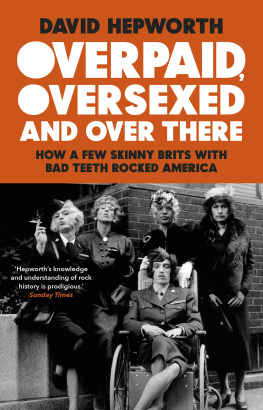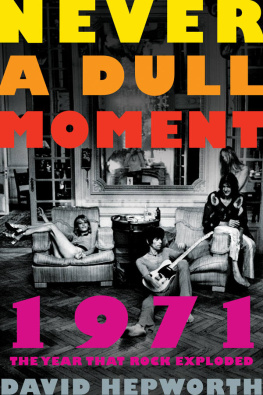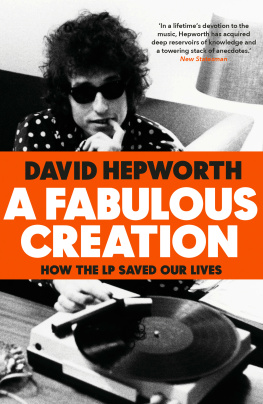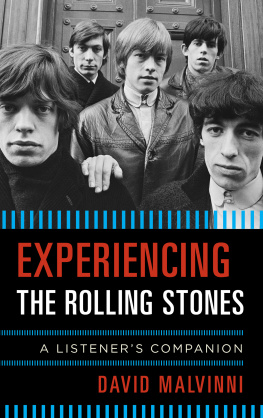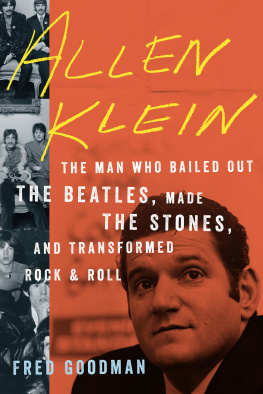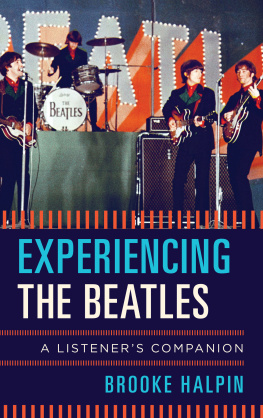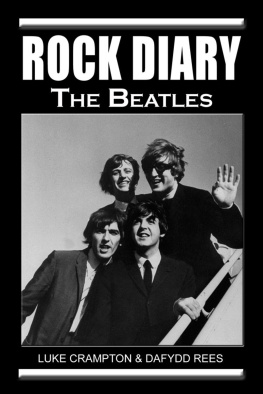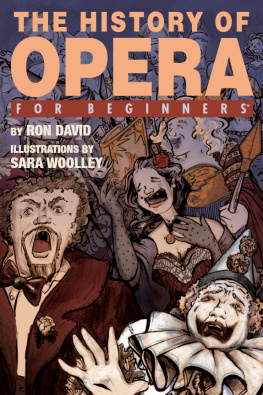Also by David Hepworth
1971 Never a Dull Moment
Uncommon People The Rise and Fall of the Rock Stars
Nothing is Real The Beatles Were Underrated and Other Sweeping Statements About Pop
A Fabulous Creation How the LP Saved Our Lives
The Rock & Roll A Level A Very Hard Pop Quiz
For more information on David Hepworth and his books,
see his website at www.davidhepworth.com
David Hepworth
OVERPAID, OVERSEXED AND OVER THERE
How a Few Skinny Brits with Bad Teeth Rocked America

TRANSWORLD
UK | USA | Canada | Ireland | Australia
New Zealand | India | South Africa
Transworld is part of the Penguin Random House group of companies whose addresses can be found at global.penguinrandomhouse.com.

First published in Great Britain by Bantam Press in 2020
an imprint of Transworld Publishers
Copyright David Hepworth, 2020
Every effort has been made to obtain the necessary permissions with reference to copyright material, both illustrative and quoted. We apologize for any omissions in this respect and will be pleased to make the appropriate acknowledgements in any future edition.
All photographs in both picture sections are Getty Images.
The moral right of the author has been asserted
Front cover photograph: the Rolling Stones in New York City, 1966 Jerry Schatzberg
Back cover photograph Express / Stringer
ISBN: 978-1-473-57340-6
This ebook is copyright material and must not be copied, reproduced, transferred, distributed, leased, licensed or publicly performed or used in any way except as specifically permitted in writing by the publishers, as allowed under the terms and conditions under which it was purchased or as strictly permitted by applicable copyright law. Any unauthorized distribution or use of this text may be a direct infringement of the authors and publishers rights and those responsible may be liable in law accordingly.
This ones for my in-laws,
Tim Timmington and Annabel Rolls
Intro
They couldnt believe it.
The Beatles, who arrived in February 1964, couldnt believe that every time they spun the dial on the transistor radios they were gifted in New York there was yet another station playing their music.
When the Rolling Stones landed in New York in June of the same year they couldnt grasp that the temperature could climb as far as the high eighties.
When Eric Burdon of the Animals got there in late 1964 he was dazzled by the fact that American TVs came on straight away and didnt take an age to warm up as the ones at home did.
The following year, Graham Nash of the Hollies was similarly amazed to learn that if you didnt have time to go to a restaurant it was actually possible to have the restaurant send food to you.
Ozzy Osbourne of Black Sabbath couldnt get over being introduced to pizza, reporting excitedly back to his friends in Birmingham, Theres a new food.
Colin Blunstone of the Zombies was nineteen when he went on his first US visit; his mother, unable to process the idea of a plane journey long enough to require the provision of meals, made him a packed lunch.
For Chris Dreja of the Yardbirds, gazing down from the eyrie of his New York hotel room, the cars on the street below appeared like boats.
For all these awestruck arrivals, everything about the United States seemed to have a dream-like quality.
The Americans who welcomed these immigrants when they arrived spoke their language but it was often difficult to work out the meaning of their welcome. Elton John, arriving in 1970, wondered why somebody had thought it a good idea to greet him at Los Angeles International airport with a red double-decker London bus.
In much the same way as the visitors had certain expectations of Americans, their welcoming parties often had a narrow notion of Englishness. Brian Jones of the Rolling Stones was met at JFK airport in New York by a photographer who insisted he pose with an Old English sheepdog because well, the hair.
These people soon realized America was, in many ways, a harder land. Pink Floyd couldnt believe it when their agent suggested their manager ought to carry a gun.
Similarly the Beatles PR man Derek Taylor got a lift from the airport to the Indiana State Fair with a driver who apologized for taking him through a section of town he called Coonsville.
Mike Pender of the Searchers saw the steam escaping from the grates on New Yorks streets and wondered from what diabolical underworld it could possibly have escaped.
Some arrivals took one look around them and decided they had finally arrived in their true home. Gazing up at the canyons of Manhattan, Rod Stewart resolved he would never see Orpington again.
They were deeply impressionable. Robert Plant was just twenty when he first went to Los Angeles and he later remembered all that English dourness swiftly disappeared into the powder-blue, post Summer of Love California sunshine.
All these young men, and they were overwhelmingly young men, came from a country that at the time believed a taste for luxury or convenience was a harbinger of inevitable moral decline. Rick Wakeman, who went to the United States with Yes in the early seventies, could not believe they were staying in hotels with rooms that had actual bathrooms because we were used to bed and breakfast in the UK.
They also came from a country not given to the advertising of feelings. John Peel, who first went in 1960, had never before heard a woman say fuck.
The natives were refreshingly demonstrative in all kinds of ways. Jeff Lynne remembers the car load of American girls passing his band on Hollywood Boulevard, raising their shirts and showing their breasts. He remembers the band of Brummies looking at each other and saying, Good here, innit?
It was all unimaginably thrilling. The time off was like an unsupervised school trip for horny young adults, financed from a bottomless exchequer. Even the work part, the bit that might be a chore back in the UK, was suddenly hugely exciting once you did it in the place you were soon referring to, to the considerable annoyance of your friends back in England, as Stateside.
Ian Hunter of Mott the Hoople, one of the few of these adventurers actually to keep a diary, likened the experience of touring America to getting married every day.
These musicians collective experience as part of what became known as the British Invasion changed them all as people. It also changed music. Furthermore, this apparently benign clash of cultures changed America as well. For the rest of us, who merely remained at home and read about it, well, it changed us too.
Once it had happened it seemed as though it had always been inevitable. Before it happened it had seemed as though it was impossible.
And the amazing thing was that when it happened, it happened so, so quickly.
Insufficient respect is paid by scholars of pop music to Germanys Iron Chancellor of the nineteenth century, Otto von Bismarck. Asked near the end of his life in 1898 what he felt had been the most significant factor affecting modern history, he answered, The fact that the Americans speak the same language as the English.
The Chancellor couldnt have been expected to see exactly how this factor would come to govern the outcome of two world wars involving the nation he represented. And it would clearly have been asking too much of him to foresee how this factor would play in another world where a shared language can similarly grease the wheels the world of the popular song.

